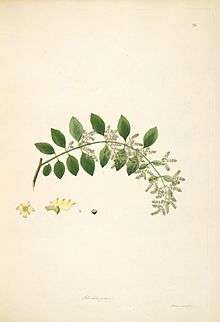Salvadora persica
Salvadora persica (arak, jhak, pīlu, Salvadora indica, toothbrush tree, mustard tree), is a species of Salvadora.[1] Used for centuries as a natural toothbrush, its fibrous branches have been mentioned by the World Health Organization for oral hygiene use.[1][2]
| Salvadora persica | |
|---|---|
 | |
| Scientific classification | |
| Kingdom: | Plantae |
| Clade: | Tracheophytes |
| Clade: | Angiosperms |
| Clade: | Eudicots |
| Clade: | Rosids |
| Order: | Brassicales |
| Family: | Salvadoraceae |
| Genus: | Salvadora |
| Species: | S. persica |
| Binomial name | |
| Salvadora persica | |
.jpg)

Description
Salvadora persica is a small tree or shrub with a crooked trunk, typically 6–7 metres (20–23 ft) in height.[1][3] Its bark is scabrous and cracked, whitish with pendulous extremities. The root bark of the tree is similar in colour to sand, and the inner surfaces are an even lighter shade of brown. It has a pleasant fragrance, of cress or mustard, as well as a warm and pungent taste. The leaves break with a fine crisp crackle when trodden on. The tree produces small red edible fruits, juicy but pungent, in clusters.[1]
Distribution and ecology
The plant is native to the Middle East and Africa,[4] and is found on desert floodplains, riverbanks, and grassy savannahs,[1]
History and use
Salvadora persica stick, known as miswak, is popular for teeth cleaning throughout the Arabian Peninsula, as well as the wider Muslim world.[1][5] The fresh leaves can be eaten as part of a salad and are used in traditional medicine.[3] The flowers are small and fragrant and are used as a stimulant and are mildly purgative.[3] The berries are small and barely noticeable; they are eaten both fresh and dried.[3] The wood of the Salvadora persica can be used for charcoal and firewood.[6] In Namibia, the mustard bush is used as drought-resistant fodder for cattle. The seeds can be used to extract a detergent oil.[4]
As of 2009, Botanic Gardens Conservation International has a total of eight Salvadora persica plants in conservation.[7]
References
- "Salvadora persica" (PDF). Agroforestry Database 4.0. 2009. Retrieved 5 April 2019.
- World Health Organization. Prevention of oral diseases. WHO offset publication No. 103. Geneva: World Health Organization; 1987. p. 61.
- Sadhan RI, Almas K (1999). "Miswak (chewing Stick): A Cultural And Scientific Heritage". Saudi Dental Journal. 11 (2): 80–88.
- Rothauge, Axel (25 February 2014). "Staying afloat during a drought". The Namibian.
- National Institute of Industrial Research (2003). Herbs Cultivation & Their Utilization. Delhi: Asia Pacific Business Press. pp. chapter 2. ISBN 978-81-7833-064-8.
- Aumeeruddy MZ, Zengin G, Mahomoodally MF (March 2018). "A review of the traditional and modern uses of Salvadora persica L. (Miswak): Toothbrush tree of Prophet Muhammad". Journal of Ethnopharmacology. 213: 409–444. doi:10.1016/j.jep.2017.11.030. PMID 29196134.
- "Botanic Gardens Conservation International - PlantSearch database|".